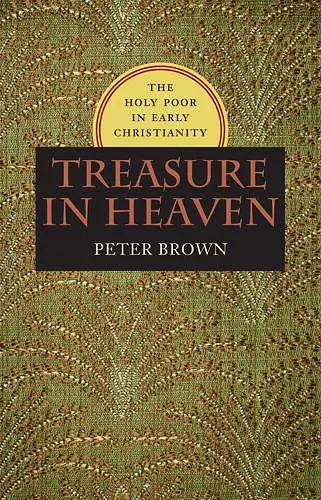Treasure in Heaven
The Holy Poor in Early Christianity
Format:Hardback
Publisher:University of Virginia Press
Published:8th Mar '16
Should be back in stock very soon

The ""holy poor"" have long maintained an elite status within Christianity. Differing from the ""real"" poor, these clergymen, teachers, and ascetics have historically been viewed by their fellow Christians as persons who should receive material support in exchange for offering immeasurable immaterial benefits—teaching, preaching, and prayer. Supporting them—quite as much as supporting the real poor—has been a way to accumulate eventual treasure in heaven. Yet from the rise of Christian monasticism in Egypt and Syria to present day, Christians have argued fiercely about whether monks should work to support themselves.
In Treasure in Heaven, renowned historian Peter Brown shifts attention from Western to Eastern Christianity, introducing us to this smoldering debate that took place across the entire Middle East from the Euphrates to the Nile. Seen against the backdrop of Asia, Christianity might have opted for a Buddhist model by which holy monks lived by begging alone. Instead, the monks of Egypt upheld an alternative model that linked the monk to humanity and the monastery to society through acceptance of the common, human bond of work. This model of Third World Christianity—a Christianity that we all too easily associate with the West—eventually became the basis for the monasticism of western Europe, as well as for modern Western attitudes to charity and labor. In Treasure in Heaven, Brown shows how and why we are still living—at times uncomfortably—with that choice.
One of the most familiar phrases in the New Testament is Jesus's exhortation to forget about earthly riches and instead store up 'treasure in heaven.' Here, Peter Brown uses the phrase to pry open ancient attitudes about the relationship between work, leisure, and piety, and the way Christianity both reflected and threatened long-standing tensions. Treasure in Heaven is wide-ranging, accessible, and highly readable. Someday Brown will write a book that does not stimulate new thinking. But this is not that day, nor is this that book."" — H. A. Drake, University of California, Santa Barbara, author of Constantine and the Bishops
""The poor were a special focus of early Christianity, but who were they? And what made them so deserving? These questions have preoccupied Peter Brown for more than a decade. After Poverty and Leadership in the Later Roman Empire and Through the Eye of a Needle, he turns here to the eastern edges of the Roman Empire and to the ‘holy poor,’ those men and women who deliberately chose poverty in order to be closer to God, and who must therefore be supported by the rest of society. With his accustomed virtuosity Brown reveals hitherto unsuspected tensions between the ‘real poor’ and the ‘holy poor,’ and the anxious questions asked about the value of work, the impact of wealth, and the nature of the ‘angelic life.’ Above all, what did ‘treasure in heaven’ really mean? In the third book of his trilogy, Brown lays bare in vivid and arresting detail the legacies of Syria and Egypt, the variety and contradictions within Christianity, and the intense self-questioning of Christians in the early centuries.""— Dame Averil Cameron, University of Oxford
ISBN: 9780813938288
Dimensions: unknown
Weight: 375g
192 pages